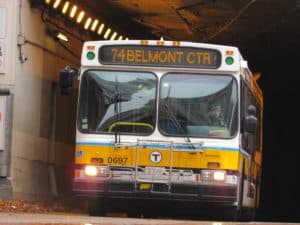As drivers and MBTA users cope with transportation system problems, the Massachusetts Department of Transportation is using an inefficient system to managed its extensive real estate assets, sitting on properties with the potential to be monetized or sold and does not have a leasing or finance director on staff to help improve its real estate operations, according to a new audit.
MassDOT auditors also concluded that the sprawling agency does not track or collect late fees on leases, that tenants have been making partial and late payments, and that five tenants were billed for lower amounts than the rents outlined in their agreements with the state. Auditors found 20 lease agreements that they determined should be renegotiated because rent revenues are lower than current market rates.
The internal audit findings are among two dozen issues flagged as in need of attention at MassDOT’s Office of Real Estate and Asset Development (OREAD), which despite its problems was able to generate $75.6 million in revenue in fiscal 2018 while spending only $3.9 million on operations.
The audit, conducted between June 2018 and March 2019, was presented to MassDOT board members on Wednesday, and outlined 13 high-risk issues, 12 medium-risk issues and two low-risk issues.
Auditors wrote that the department is likely leaving revenue on the table, but MassDOT officials did not put a dollar amount on potential forgone revenue. Auditors also noticed issues at the Haymarket Center Garage, where WCVB previously found dozens of potentially ineligible tenants taking advantage of a discount program.
The findings come as state lawmakers, who just disposed with a huge budget surplus, prepare a transportation revenue package, arguing that MassDOT and the MBTA need more funding to address service problems and alleviate traffic woes. Gov. Charlie Baker has said he believes the department already has the money it needs.
Some corrective actions are already underway, director of audit operations Jim Logan told board members, and the audit recommended strategies to address each problem, including purchasing new real estate asset management software and hiring additional staff.
New Software Needed
The need for new software was a thread running through several of the high-risk issues identified. The department’s Office of Real Estate and Asset Development manages 188 revenue-generating leases for MassDOT-owned property, but managing bills and payments can be clunky under existing processes, according to auditors.
“The current real estate asset management process is not automated and is heavily dependent on MS Excel usage,” the audit found. “This process is manual, decentralized and inefficient, as information is not easily available for OREAD to track and reconcile.”
For two years, the real estate office has submitted a request for proposal to acquire a new software system, but a technology steering committee denied allocating funds. Auditors said a new system could cost $100,000 to purchase and $50,000 per year to maintain.
“Quite frankly, the department needs the revenue,” MassDOT Board Vice Chair Betsy Taylor said at an Audit and Finance Committee meeting Wednesday. “We have a right to charge current rates for our vendors and not be taken advantage of, and that only happens if there’s real management attention focused on a regular basis.”
The audit looked closely at the Haymarket Center Garage, which has offered discounted rates to North End residents for decades in the wake of the Big Dig. A 2018 investigation by WCVB found that more than 40 percent of residents who receive the discount “are either questionable or don’t qualify at all.”
A similar internal review in 2018 led to 28 North End resident discount stickers being invalidated, according to the audit. Logan said during Wednesday’s meeting that the issue with residents “has been eliminated” now that MassDOT has a clear list of who qualifies.
However, the audit found that some North End businesses participating in a validation discount program at the garage also pose question marks: 11 of 33 businesses listed as offering validation discounts are outside the North End or have closed, six could not be verified by name or address, and investigators found some examples of multiple businesses using the same qualification stamp number. The state launched a request for proposals in July 2019 to seek an automated validation system.
The validated rates at the garage also have not increased since 1998, auditors said.
More Real Estate Staff Called For
More staff will be needed to address several real estate issues, including two senior positions that remain unfilled. OREAD does not have a leasing manager, despite the position existing four years ago, and the finance director post in the office has been vacant since January 2019.
Efforts are underway to renegotiate the 20 leases managed by the real estate office that have rents below market rates. Auditors suggested any additional cost from adding staff to address the issue would be balanced by savings from more current rents.
An agency spokeswoman said the department’s assets “are encumbered under state law for transportation uses with a small proportion available for monetization.” She said the agency over the last five years has become become “much more efficient and proactive, resulting in a 70 percent growth in real estate revenue.”
The agency plans to “continue to work with municipalities, state agencies and private sector entities to maximize opportunities while not negatively impacting its core transportation mission. MassDOT will continue to evaluate the audit and has already implemented several recommendations,” the spokeswoman said.




 |
| 


